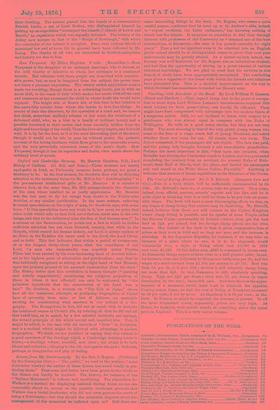'tendency to be. In the first sermon, Dr. Goodwin does
well in directing attention to the testimony borne by Mr. Mill in his " Autobiography " to the pre-eminent intellectual gifts of Mr. Maurice. It is curious to ebserve how, at the same time, Mr. Mill misapprehends the character of the man whose intellect he so justly appreciates. Mr. Maurice was the last man to fly for refuge from doubt to the Thirty-nine Articles, or any similar justification. In the same sermon, referring to recent speculations on the origin of man, Dr. Goodwin says, with some force, "If this.speculation have any truth in it, how must we prize that other truth which tells us that God, nevertheless, made man in his own image, and that in the fullness of time the Son of God became man ?" In a sermon on the Resurrection, he points out a fact to which he thinks sufficient attention has not been directed, namely, that while in the Gospels, which record his human history, our Lord is always spoken of
as Jesus, in the Epistles the name used is the Lord, the Lord Christ, and so forth. This fact indicates that within a period of twenty-one,
or at the longest, thirty-three years, after the crucifixion of our Lord, "a man who undoubtedly was crucified under Pontius Pilate had been exalted by his ever-increasing band of devoted follow- ers to the highest point of admiration and glorification ; nay, that he was habitually recognised as sitting on the right hand of God Himself, upon the primary ground of his assorted resurrection from the dead."
The Bishop infers that this revolution in human thought (" amazing and utterly unparalleled," considering the religious prejudices of those in whom it was effected) can only be explained by "the primitive hypothesis that the resurrection of the Lord was a fact." Dr. Goodwin, in a sermon on "The Life of Jesus," shows bow all the numerous attempts at producing biographies of Christ have of necessity been more or less of failures, no materials existing for constructing what answers to our notions of a bio- graphy. The Evangelista, in fact, did not so much wish to describe the continued course of Christ's life, by relating all that he did and all that befell him, as to assert, by a few selected incidents and sayings, the inward principle of life which moved and impelled him. This, it might be added, is the ease with all records of "lives" in Scripture, and is a method which might be followed with advantage in modern biographies. We think we are justified in saying that this volume is
a good specimen of the theology which a Cambridge training tends to foster,— a theology robust, sensible., and clear ; not afraid to be both liberal and orthodox ; clinging to the old, but open to the new ; deficient, perhaps, in imagination and play of feeling.


































 Previous page
Previous page